AWS vs. Azure vs. Google Cloud Comparison, and an S3 Storage Alternative
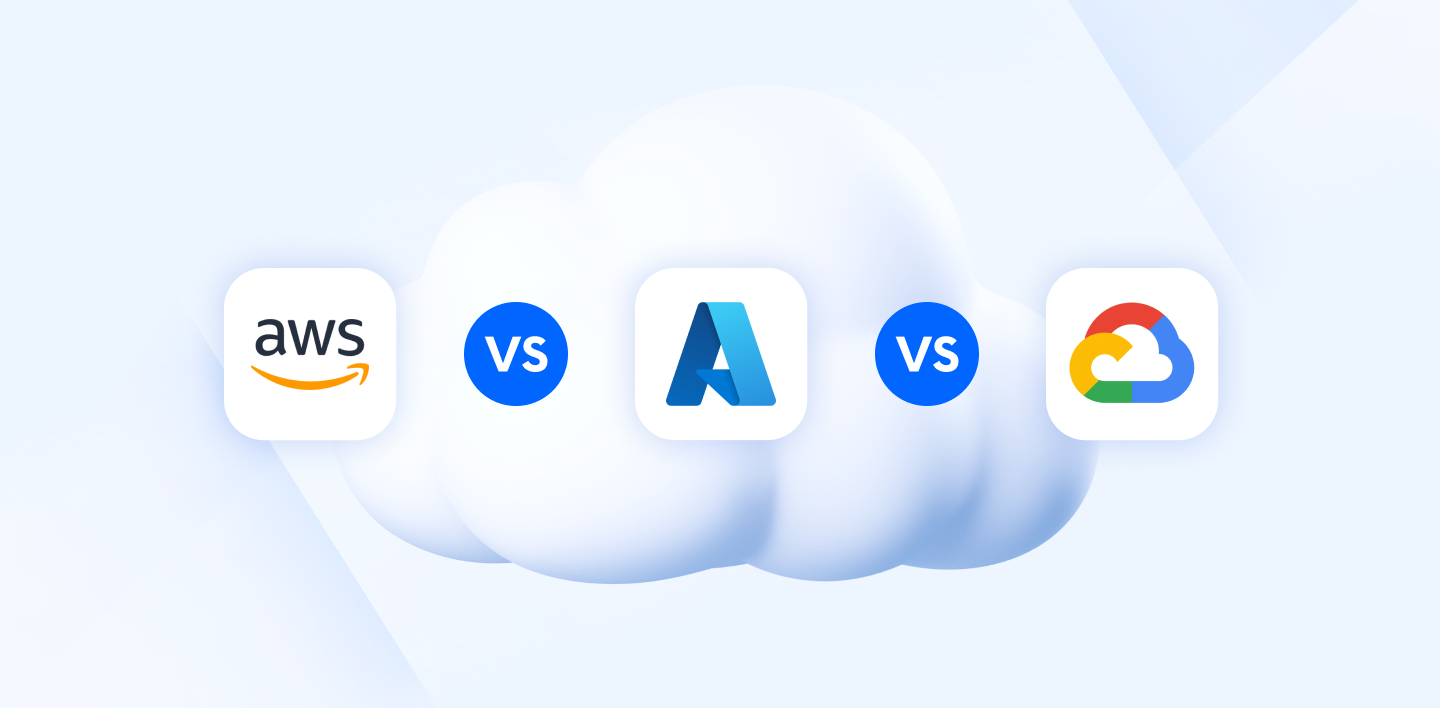
Amazon Web Services, Microsoft Azure, and Google Cloud dominate the tech industry when it comes to cloud storage management and storing large-scale data for enterprises. Each service offers an abundance of features integrated into its service to suit businesses' unique needs ranging from:
- Scalable storage solutions for objects, files, and archives.
- Data backups and disaster recovery.
- Databases for real-time data processing and analytics.
- Tools for developers for support with DevOps, APIs, and SDKs for various programming languages.
- Hybrid and Multicloud Solutions to manage multicloud environments.
- Encryption, identity management, compliance certifications, and tools for monitoring and mitigating security threats that can cost businesses millions.
With all these features available, businesses interested in multi-cloud environments may be left wondering who wins the AWS vs. Azure vs. Google Cloud battle.
To help you answer this question, we’ll explain each service provider in detail, including pricing, features, and whether they are the most efficient object storage products available or if there are alternatives available.
We will also mention how Internxt S3 object storage can work as an alternative to AWS, Azure, and Google Cloud for storing objects in data lakes, for fast access to data without having to pay additional transfer or API fees.
A pay-as-you-go model is the quickest and easiest way to manage vast amounts of data stored in buckets. Internxt’s green cloud computing platform manages data with maximum security, GDPR compliance, and more, all at just €7/TB/month.
Table of contents
- Amazon Web Services (AWS)
- Microsoft Azure
- Google Cloud
- AWS vs. Azure vs. Google Cloud: what they have to offer
Amazon Web Services (AWS)
AWS is the leading cloud computing provider, with over 1 million active users in 190 countries and five times the number of deployed cloud infrastructures.AWS launched in 2006 and offers Amazon S3 (Simple Storage Service) for object storage for on-demand cloud computing.
S3 storage is one of the most popular types of cloud storage that enables businesses to access scalable resources quickly without investing in physical hardware.
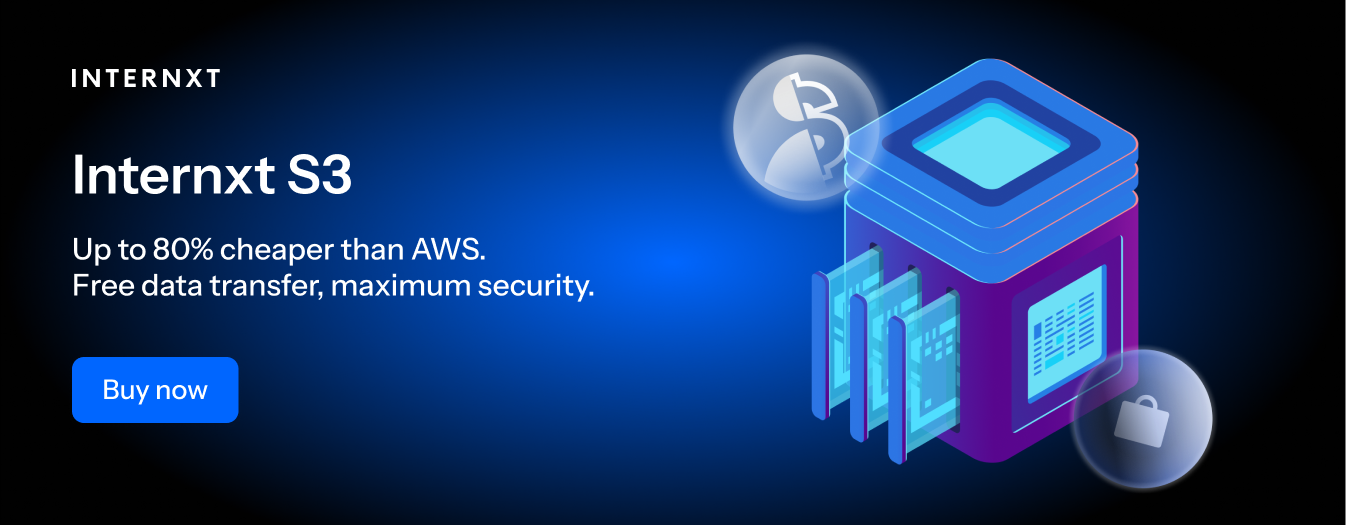
Currently, AWS boasts over 200 fully featured services catering to various use cases, including web applications, machine learning, data analytics, and enterprise-grade solutions. As a result, AWS is a popular choice for startups, enterprises, and governments needing to store, manage and access large-scale data rapidly.
Microsoft Azure
Azure is a cloud computing provider from Microsoft that was launched in 2010 and currently offers services in over 60 regions worldwide.
Azure is one of the top object storage solutions for enterprises that are already integrated with Microsoft technologies, such as Office 365, Windows Server, and Active Directory.
Regarding AWS vs. Azure vs. Google Cloud, Azure may be the most convenient choice for businesses that rely on Microsoft tools to migrate data to the cloud efficiently and access over 200 services, ranging from virtual machines and AI tools to analytics and Internet of Things (IoT) solutions.
Google Cloud
The final contender in these popular cloud platforms is Google Cloud. Google Cloud was founded in 2008 to provide modular cloud services, including computing, data storage, data analytics, and machine learning.
As one of the biggest names in the tech world, Google Cloud’s market share has grown to 28%, making it one of the top 10 cloud providers with over 950,000 customers. Currently, Google Cloud Platform provides infrastructure as a service (IaaS), platform as a service (PaaS), and serverless computing environments.
AWS vs. Azure vs. Google Cloud: what they have to offer
Below are the features you can expect for each cloud platform: AWS, Azure, and Google Cloud.
Overview of AWS features
Aside from S3, AWS also offers Elastic Compute Cloud (EC2), a service that allows businesses to rent and run virtual servers in the cloud.
E2C is a fully scalable solution for small or large web applications that can handle millions of users during peak or less busy hours for optimal cloud performance regardless of the number of data requests.
With Amazon E2C, you can access applications faster thanks to 99.99% availability, develop Apple platforms to build and text MacOS workloads, and train and deploy machine learning (ML) applications.
Amazon Relational Database Service (RDS) offers the chance to manage databases optimized for total cost of ownership. With it, you can create and customize databases to meet your business needs across eight engines and two deployment options.
AWS also offers developer tools like AWS CodeBuild, CodeDeploy, and CodePipeline for code integration and delivery. Finally, Amazon CloudFront is a service to deliver media, data, and APIs to customers on a global scale, and is valued for its low latency and high transfer speeds.
Overview of Azure features
Azure is a popular choice for Windows users and developers as it integrates easily with Visual Studio and Visual Studio Code.
Azure offers support for Virtual Machines (VMs), which provide an affordable solution for on-demand, scalable cloud computing services. Azure VMs are hosted in Azure’s cloud but work the same way as physical desktops.
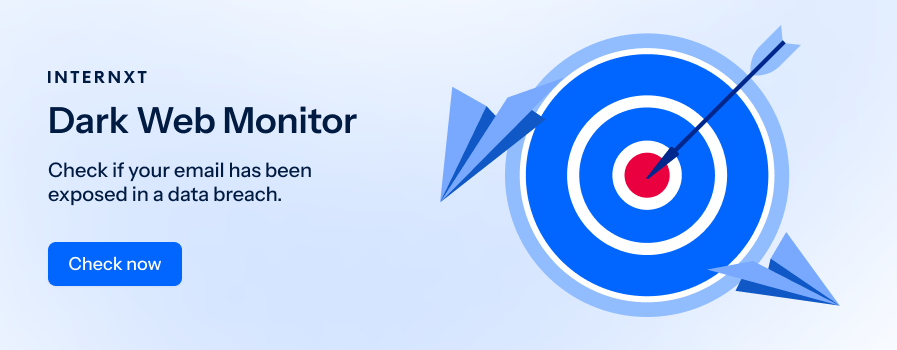
With this service, Azure can run workloads for development, testing, quality assurance, advanced analytics, ML and AI, rendering videos, and more at a price you set in advance.
For your big data needs, Azure offers HDInsight, which runs open-source frameworks for migrating and processing data workloads to the cloud. HDInsight supports popular frameworks such as Hadoop and Spark.
You don’t need to install any hardware, so starting your data management process is easy and quick. When used with Azure CosmosDB, managing your data at scale becomes much simpler.
Overview of Google Cloud features
Google Cloud offers Virtual Machines, object storage, Data Warehouse Management, Command-Line tools, and analytics. New customers to Google Cloud will receive $300 free credits to run, test, and deploy workloads.
Similar to Azure, Google Cloud databases integrate well with advanced analytics, Google AI, and machine learning tools. Services Google Cloud offers include:
- Cloud SQL, used for relational databases,
- Firestore for NoSQL document storage,
- BigQuery for data warehousing.
Developers can begin their proof of concept with Google Cloud and explore the many tools, APIs, and pre-built cloud automation tools that can be deployed via the Google Cloud console.
AWS, Azure, and Google Cloud pricing structure
Below is the price comparison of AWS vs. Azure vs. Google Cloud.
| Provider | Pricing Options |
|---|---|
| AWS |
|
| Microsoft Azure |
|
| Google Cloud Platform (GCP) |
|
Prices may vary depending on your needs, but each website offers the option to speak to a representative to determine which plan is best based on your team’s storage requirements.
To manage your storage costs, you can use the following tools each service offers:
- Amazon: The AWS Budgets and Cost Explorer tools track your spending and usage and offer tips to optimize your cloud environment to save money and improve performance. The AWS website also has an AWS S3 storage costs calculator.
- Azure: Azure’s Cost Management and Billing monitors and optimizes costs by providing personalized recommendations.
- Google Cloud: Google provides account managers with billing reports and cost management tools. You can also manage and forecast future costs with Google’s pricing calculator.
AWS vs. Azure vs. Google Cloud security
Here's a concise summary of the most recent security features when considering AWS vs. Azure vs. Google Cloud.
AWS
AWS offers the following security features:
- Identity management: AWS Identity and Access Management (IAM) allows secure access to resources via access permissions.
- Network security: Security groups and network ACLs for traffic control.
- Data encryption: In transit and at rest encryption and KMS (Key Management Service).
- Threat detection: AWS Shield, WAF, and Amazon Inspector offer automated security assessments.
- Compliance: ISO 27001, HIPAA, and GDPR to support compliance requirements.
Azure
Microsoft has the following security protocols for its cloud platform:
- Identity Management: IAM tools integrate with Microsoft’s ecosystem to secure apps and data, streamlining the cloud migration process for companies already using Microsoft in their team.
- Network Security: Azure Virtual Network provides enhanced firewall and DDoS protection to prevent network attacks.
- Data Encryption: Data encryption at rest and in transit and other encryption standards like TLS ensure that data remains secure.
- Threat Detection: Azure Security Center provides advanced threat protection, and Azure Defender includes tools for threat management.
- Compliance: ISO 27001, HIPAA, FedRAMP, and GDPR.
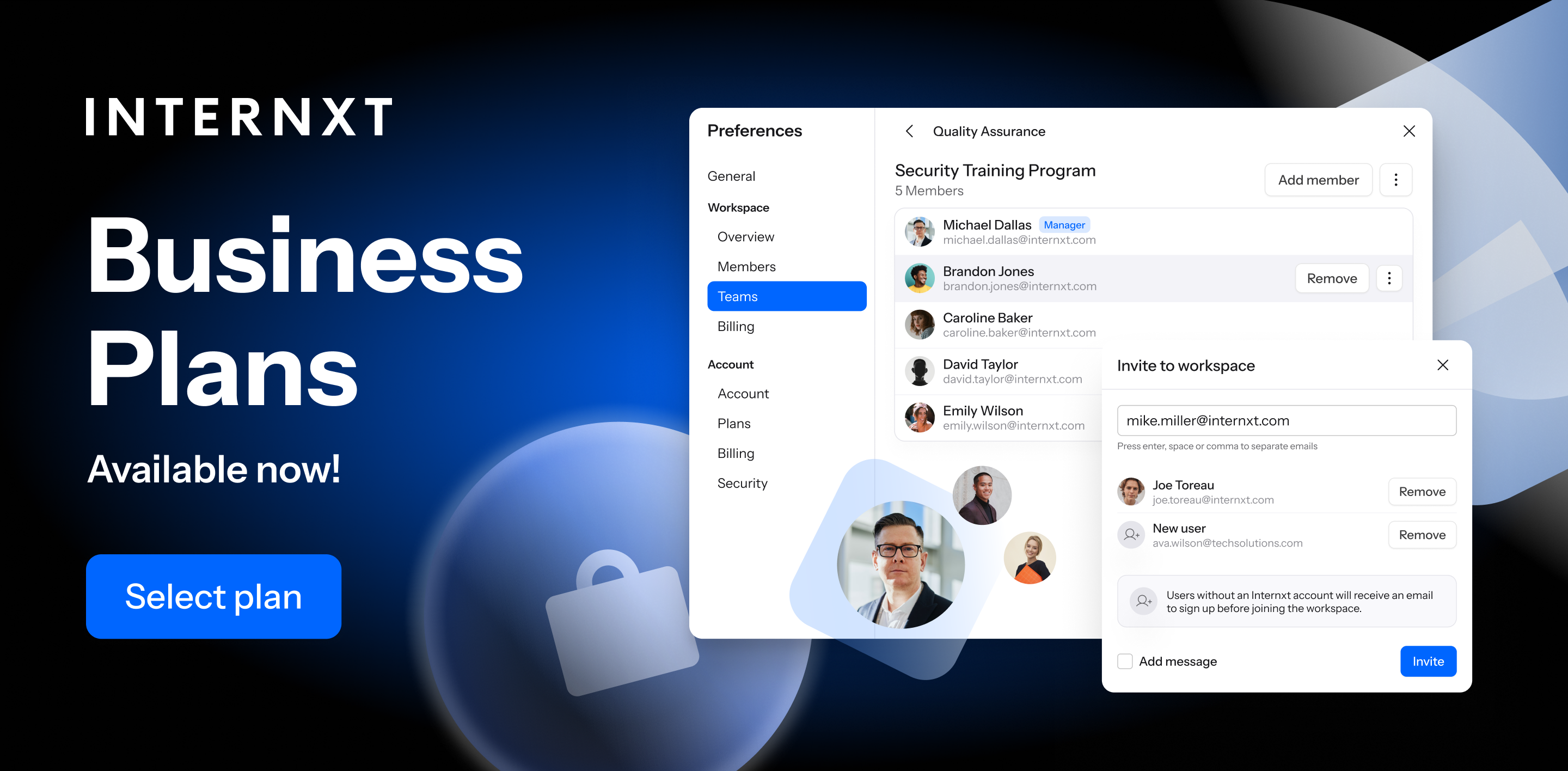
Google Cloud
For security, Google Cloud offers:
- Identity management: Google Cloud IAM enforces the principle of least privilege to ensure that nobody can access data higher than their access privileges.
- Network security: Google Cloud VPC offers firewall protection and custom route management to prevent hackers from accessing the network.
- Data encryption: GCP automatically encrypts data at rest in transit to ensure total data security.
- Threat detection: Google Cloud Armor protects DDoS protection and tools to mitigate fraud.
- Compliance: Google Cloud complies with standards like ISO 27001, HIPAA, FedRAMP, and GDPR.
These security features will help prevent cyberattacks with the following actions that focus on data security:
- Identify: Integrate security tools to understand and manage risks with deep visibility and automation.
- Prevent: Implement permissions and levels of access to protect the infrastructure of your cloud environment by adopting zero-trust policies.
- Detect: Log and monitor who accesses the cloud platform to prevent unauthorized access.
- Respond: Respond to incidents with automated response and recovery to help security teams shift their primary focus from responding to threats to analyzing the cause and preventing further damage.
- Remediate: this allows you to secure your cloud environment in near real-time.
AWS vs. Azure vs. Google Cloud: how to choose based on your needs
Based on the kind of industry your business works in and the size of your team, each service will be able to fit your needs differently. Let’s take a look at what each platform offers.
AWS use cases
One of the biggest industries using AWS is Netflix, which uses Amazon S3 to store billions of data objects in its digital library worldwide.
AWS is equally valuable to startups and smaller businesses as it offers the broadest range of tools, and the global infrastructure allows fast data access at reduced latency. Should your business need to scale rapidly, AWS S3 may be the best use case for your business.
If you want all the benefits of AWS S3 without the complicated pricing or additional fees, Internxt S3 will offer object storage for your data lakes and warehouses that could save your business up to 80% in costs compared to AWS.
Internxt S3 has all the security and data management features, such as data redundancy, built into it as standard. At a fixed rate of €7/TB/month, you can easily scale your storage and set your budget without complications.
Azure use cases
Azure easily integrates into Microsoft's existing product suite, so its use case is heavily aimed at current Microsoft users.
Azure’s biggest use case is with Walmart, which uses it to connect to IoT applications for its refrigeration units to reduce energy usage and apply machine learning for supply chain routing. Azure also uses machine learning and AI to understand customer preferences for a better customer experience and efficient data management.
Much like Internxt, Microsoft can store and analyze petabytes of data with object storage for easy, fast, and efficient data access.
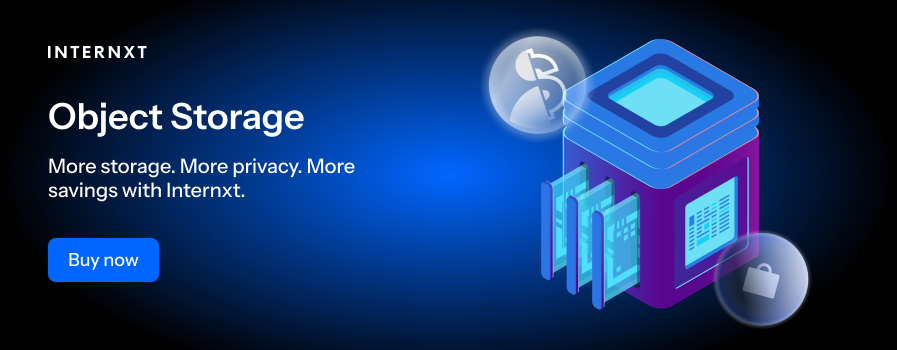
Google Cloud use cases
Google Cloud handles the data management for X (formerly Twitter), which distributes event data such as tweets and notifications. Due to its strong machine learning and AI tech, Google Cloud is an attractive option for industries that need to analyze data for advanced decision-making, such as healthcare or retail.
As is the case with all of Google’s products, using AI and holding encryption keys to data is not the most privacy-centric solution.
If Google holds the encryption keys, it can theoretically decrypt and view content at any time, posing risks to the privacy of sensitive data. AI is also a huge privacy concern for many customers, so this should also be considered when deciding on AWS vs. Azure vs. Google Cloud.
For guaranteed privacy of all files, Internxt encrypts your data in transit and at rest. We support the HTTPS protocol and server-side encyrption with customer-provided encryption keys (SSE-C).
AWS, Azure, and Google Cloud alternative: Internxt S3
As the AWS vs. Azure vs. Google Cloud battle ends, each service offers the same cloud platform at its core.
Choosing which one is right for you will depend on budget, specific features, ML or AI for data, and the size of your infrastructure (and potential size in the future).
Should you need an S3 model for your cloud storage to manage unlimited data for your lakes or warehouses with a 100% hot solution, maximum security, disaster recovery, and no egress fees, try out Internxt’s powerful S3 and GDPR-compliant cloud storage solution.
Internxt S3 is a secure cloud storage for law firms, hospitals, enterprises, and anybody looking for an object storage cloud provider.
Internxt provides cloud storage for many businesses, Valencia CF, so you can be sure you have the best and most secure cloud storage to meet your business needs with features such as secure file sharing, backups, Rclone, and Cyberduck support.
Choosing Internxt for your object storage needs can save you huge amounts of money compared to investing in AWS, Azure, or Google Cloud.
For more information about how Internxt can meet your data storage needs with our S3 solutions, don’t hesitate to contact us at hello@internxt.com. Visit our website to try out our S3 storage today!

